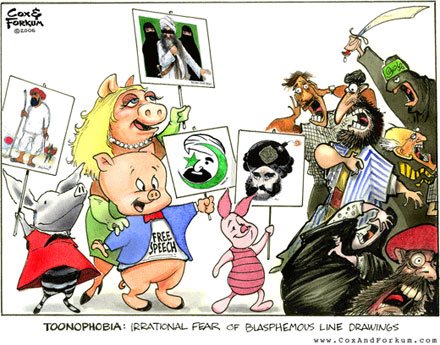acaba de salir un analisis del futuro conflicto con Iran lo publico Oxford research group estas son las partes mas relevantes:the Nature of U.S military actionFrom a US perspective, there would be two main reasons for taking action against Iranian nuclear facilities. One would be to damage the overall programme to the extent that any plans to produce nuclear weapons could be set back at least five years and preferably longer, but a second would be to make it clear that the United States is prepared to take significant preventative military action in this regard, and would, by implication, take action against other Iranian activities that it might find unacceptable, not least any Iranian interference in Iraq. The core problem is that any military action would, in practice, have to involve more than just a series of attacks on a small range of directly nuclear-related sites. Moreover, once such action started, it would be virtually impossible to maintain any relationship with Iran except one based on violence. Apart from anything else, all the available evidence suggests that any military action would have a very powerful unifying effect within Iran, bringing a wide range of political and religious opinion behind the administration, increasing both its power base and its stability. Even the current administration could be expected to be a focus of support. Those elements of the theocracy that are at present suspicious of Mr Ahmadinejad and may still resent his unexpected electoral success, would not stand in the way of a united Iran faced with US military action. Although the United States has a major problem of overstretch affecting its Army and Marine Corps, an attack on Iranian nuclear facilities would be undertaken almost entirely by the Air Force and the Navy. To have the maximum impact, it would be done by surprise, utilising land-based aircraft already in the region, long-range strike aircraft operating from the United States, the UK and Diego Garcia, and naval strike forces involving carrier-borne aircraft and sea-launched cruise missiles. At any one time, the US Navy keeps one aircraft carrier battle group on station in or near the Persian Gulf. Such groups rotate, and there are periods when two are on station, providing over 150 aircraft, together with several hundred cruise missiles. Similar numbers of land-based aircraft could be assembled with little notice, given the range of US bases in the region, and B-1B and B-2 bombers could operate from outside the region. In particular, the specialised facilities required to operate the stealth B-2 aircraft are now available at Fairford air base in Gloucestershire. Air strikes on nuclear facilities would involve the destruction of facilities at the Tehran Research Reactor, together with the radioisotope production facility, a range of nuclear-related laboratories and the Kalaye Electric Company, all in Tehran. The Esfahan Nuclear Technology Centre would be a major target, including a series of experimental reactors, uranium conversion facilities and a fuel fabrication laboratory. Pilot and full-scale enrichment plants at Natanz would be targeted, as would facilities at Arak The new 1,000 MW reactor nearing completion at Bushehr would be targeted, although this could be problematic once the reactor is fully fuelled and goes critical some time in 2006. Once that has happened, any destruction of the containment structure could lead to serious problems of radioactive dispersal affecting not just the Iranian Gulf coast, but west Gulf seaboards in Kuwait, Saudi Arabia, Bahrain, Qatar and the United Arab Emirates. As well as the direct human effects, since these comprise the world’s most substantial concentration of oil production facilities, the consequences could be severe. All of the initial attacks would be undertaken more or less simultaneously, in order to kill as many of the technically competent staff as possible, therefore doing the greatest damage to longer-term prospects. This would be a necessary part of any military action and would probably extend to the destruction of university laboratories and technology centres that indirectly support the Iranian nuclear scientific and technical infrastructure. Such an aspect of the attack is not widely recognised outside of military planning circles but would be an essential component of the operation. Given that the aim is to set back Iranian nuclear potential for as long as possible, it would be essential to go well beyond the destruction of physical facilities that could be replaced quite rapidly. The killing of those with technical expertise would have a much more substantial impact on any efforts to redevelop nuclear capabilities. Furthermore, since such expertise is known to include foreign nationals, the killing of such people already working in the country would serve as a deterrent to the involvement of others in the future. Iran currently has limited air defences and a largely obsolete and small air force. Even so, defence suppression would be a major aspect of military action, primarily to reduce the risk of the killing or capture of US aircrew. It would involve the targeting of radar facilities and command and control centres, as well as Western Command air bases at Tehran, Tabriz, Hamadan, Dezful, Umidiyeh, Shiraz and Isfahan, and Southern Command air bases at Bushehr, Bandar Abbas and Chah Bahar. A particular concern for US forces is the continued deployment by Iran of 45 or more of the American F-14A Tomcat interceptors and their long-range AWG-9 radar equipment. 79 planes were originally procured before the fall of the Shah and around 30 are available operationally at any one time out of those still deployed. Research, development and production facilities for Iran’s medium-range ballistic missile programme would be priority targets, as would bases at which these mobile missiles are deployed. Because of their mobility, surprise would once again be essential. US forces have already used reconnaissance drones to map Iranian facilities and satellite reconnaissance and a range of forms of electronic surveillance, have provided information on the nuclear infrastructure and more general defence forces. The attacks described so far would involve a strong element of surprise in relation to the core nuclear infrastructure and the air defence system, with these undertaken in a matter of hours. Up to a hundred sorties by strike aircraft, backed up by several hundred additional sorties by aerial refuelling, defence suppression and reconnaissance aircraft would be accompanied by two hundred or more cruise missile sorties. Following immediate bomb damage assessment, major targets would be revisited in the following days in parallel with attacks on less time-urgent targets. For US forces, the main period of intense military activity might extend over 4-5 days but could continue for several days more, depending on Iranian responses.
Pre-empting Iranian ResponsesIn addition to the substantial programme of air strikes and missile attacks on nuclear, missile and defence facilities, US military operations would also be aimed at pre-empting any immediate Iranian responses. Most significant of these would be any possible retaliatory Iranian action to affect the transport of oil and liquefied natural gas through the Straits of Hormuz. On the assumption that this would be an obvious form of retaliation, it would be necessary to destroy coastal anti-ship missile batteries and Iran’s small force of warships. The main base and dockyard is at Bushehr; the operational headquarters is at Bandar Abbas which is also the base for Iran’s small flotilla of Russian-built Kilo-class submarines, although Chah Bahar is due to become the new base for these three boats. Other bases for light naval forces include Kharg Island at the head of the Gulf and islands in the Abu Musa group south-west of the Straits of Hormuz, these being heavily defended and well supplied The small Iranian Navy suffered severe losses in its exchanges with the US Navy at the end of the “tanker war” in April 1988, and it is probable that the main emphasis will be on fast light forces, including speedboats crewed by those prepared to die. These would be Iranian Revolutionary Guard (IRG) forces and they would most likely place the greatest emphasis on attacking tanker traffic rather than US naval units. Operating bases for these forces would be priorities for attack. It would also be assumed that IRG elements would move into some parts of Iraq to link up with sympathetic militia. To demonstrate that any such moves would incite retaliation, it is probable that military action would target forward-based ground force units both of the IRG and of the regular army. Of the numerous Iranian Army bases, those close to the border with Iraq at Abadan, Khorramshahr, Ahvaz, Dezfuland and possibly Mahabad would be the most likely targets, as would major IRG centres. A range of logistical support facilities would be targeted, with this possibly extending to destruction of bridges. Given the porous nature of the border, this latter action would be primarily symbolic.
Casualties It is very difficult to predict the level of Iranian military and civilian casualties, but two points may be made. The first is that, as in Iraq during the first three intense weeks of war, early civilian casualty reports will be incomplete and the full extent of casualties unlikely to come to light for several months. However, any reports of civilian casualties which do emerge would be widely disseminated by the Iranian media and by commercial media networks such as al-Jazeera elsewhere in the region. The second is that any surprise attack will catch many people, be they civilian or military, unawares and unprotected. There will be no opportunity for people to move away from likely target areas as was possible in the days and weeks leading up to the invasion of Iraq. Military deaths in this first wave of attacks against Iran would be expected to be in the thousands, especially with attacks on air bases and Revolutionary Guard facilities. Civilian deaths would be in the many hundreds at least, particularly with the requirement to target technical support for the Iranian nuclear and missile infrastructure, with many of the factories being located in urban areas. If the war evolved into a wider conflict, primarily to pre-empt or counter Iranian responses, then casualties would eventually be much higher. Iranian Responses Given the small size and largely obsolete nature of the Iranian Air Force and air defence systems, Iran would be able to offer little direct opposition to the kind of US attack outlined above. Moreover, US action would have been designed to destroy what limited capability might be available. be immediate if apparent indications of comprehensive US military success in doing serious damagUS action to pre-empt obvious Iranian responses, such as affecting tanker traffic through the Straits of Hormuz or moving Revolutionary Guard elements into parts of Iraq, could well mean that there would e both to Iran’s presumed nuclear weapons development potential and in countering immediate Iranian responses. This could turn out to be as misleading as the early apparent successes in Iraq following regime termination within three weeks of the start of that war in March 2003. In fact, Iran has many options available in response, even if they are not options of immediate effect. Redevelopment of nuclear programme. However badly Iran’s nuclear infrastructure was damaged in an attack, an immediate response would be to reconstitute the infrastructure and work rapidly and in secret towards a clear nuclear weapons capability. This would probably involve giving formal notice of withdrawal from the Non-Proliferation Treaty, followed by the immediate reconstitution of the nuclear infrastructure, developing it wherever possible in a more survivable manner. This would include systems redundancy, dispersal of research, development and production capabilities and the use of deep underground facilities for future work wherever feasible. Furthermore, there may already be elements of redundancy built in to the current Iranian civil nuclear programme and there may be elements of which the United States is unaware. If so, this would aid the reconstitution of capabilities. More generally, any hope of negotiating away Iran’s suspected nuclear weapons programme in the years after a US attack would vanish, undermining global non-proliferation efforts. Rather than living with an Iran that had the potential to produce nuclear weapons, the US action would almost certainly guarantee an overtly nuclear-armed Iran for decades to come or, alternatively, further instances of military action. Hezbollah. Iran would be likely to encourage more militant action by Hezbollah in Southern Lebanon. Given that Hezbollah now has large quantities of surface-to-surface missiles of a range sufficient to reach Haifa and other population centres in the north of Israel, a vigorous Israeli response should be expected, further adding to an atmosphere of crisis. It is true that Hezbollah is currently undergoing a period of substantial political transformation, moving more firmly into the social and political arenas, so that major military action against Israel would be a regression to previous patterns. This is to be expected, though, given the likely extent of the popular support for Iran resulting from US military action. Any action from Hezbollah would result in substantial Israeli military responses. At the very least these would involve air strikes, the use of artillery and battlefield missiles and naval bombardment. They might extend to cross-border operations by infantry and armoured units. Straits of Hormuz. While one major aim of any US military action would be to forestall Iranian interference with Gulf oil exports, this would have to be near total in its effect on Iranian capabilities. This would be difficult if not impossible to achieve, leading to a fear of attack which alone would have a formidable impact on oil markets. West Gulf oil facilities. Furthermore, it would be possible for paramilitary units linked to Iran to develop the ability to sabotage oil export facilities in western Gulf states such as Kuwait, Saudi Arabia and the United Arab Emirates. High levels of security would undoubtedly be maintained in these states, yet determined paramilitary groups would be difficult to control with certainty. Even one or two incidents of sabotage would raise tensions and further affect oil markets. Revolutionary Guard. The Revolutionary Guard remains a strong if largely free-standing component of the Iranian defence system. While its facilities on the Persian Gulf coast and close to the border with Iran might be damaged in the early waves of US attacks, there would also be a very substantial base of support for the Guard, expressed by immediate improvements in morale, a greatly enhanced ability to recruit, and a determination to respond. Although US military action against Guard facilities might be undertaken to “warn off” the Guard from interfering in Iraq, the effect would almost certainly be shortlived, and the numerous links which already exist between Guard units and Iraqi Shi’a militias would be activated rapidly. Such demonstrable Iranian involvement in the Iraqi insurgency would result in an escalating US military response involving cross-border attacks on Iranian logistics. This would increase Iranian civilian casualties, cause economic disruption and also further increase internal Iranian support for the current regime. Overall, and given the nature of the Iran/Iraq border, Iran would be in a very strong position to aid elements of the Iraqi insurgency in numerous ways, providing a wide range of armaments as well as personnel. This would give a substantial boost to an insurgency that, even three years after the termination of the old regime, is as active as ever. International support. Given recent major long-term economic agreements between Iran and China, and also between Iran and India, as well as close links with Russia, a US attack would attract major criticisms, including from two of the five permanent members of the UN Security Council – China and Russia. The current Russian administration might prefer privately to see US military action avoided, but it would be in a very difficult position in relation to many of its neighbouring allies if it were not to condemn US military action against Iran most strongly, especially if this escalated to a protracted conflict.Israeli Military Action If action against Iranian nuclear facilities was undertaken by Israel rather than the United States, it would be on a smaller scale although still far more substantial than the Israeli attack on the Iraqi Osiraq nuclear reactor in 1981. Israeli military action would be concentrated on all of the nuclear research, development and support facilities, especially personnel, and on the Iranian missile forces, their production and development. There would be less concern with the Revolutionary Guard or with protection of Gulf oil facilities. Iran, on the other hand, would see any Israeli action as being done in close collaboration with the United States, and would respond against US and Gulf oil interests in much the same way as if the attacks had been conducted by the United States itself. This would, in turn, bring US forces into the confrontation as the United States reacted to such moves. Any such escalation of the war would be of value to Israel as it would tend to weaken the wider military capabilities of Iran. Thus, Israeli action would be intended to severely damage Iranian nuclear potential while being likely to bring the United States into the conflict. Iran’s more direct reaction to Israeli military action might be to put substantial emphasis on encouraging Hezbollah to act against Israel, possibly through missile attacks into Northern Israel. This, too, would be advantageous to the Israeli government of the day, whatever its complexion, as it has military forces that could stage very substantial action against Hezbollah, especially through air strikes into Southern Lebanon. Such strikes would be aimed, in particular, at targeting the stores of the longer-range Katyusha-type rockets recently acquired by Hezbollah. While Israel would gain in the short term from an attack on Iran, the longer-term consequences would be far less positive. In addition to the problems created for the United States in Iraq, causing tensions between Israel and its closest ally, Israel would be faced with Iran determined to develop a nuclear weapons capability in the shortest possible time in a regional climate in which opposition to the State of Israel would have been substantially enhanced.





